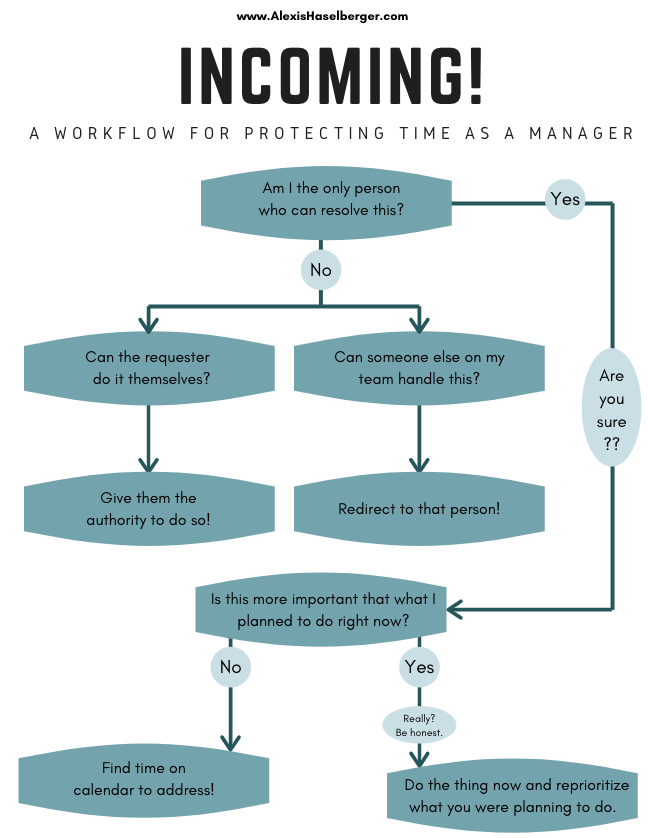
- admin
- November 11, 2020
- 9:14 am
Why Good Leadership and Time Management Go Hand in Hand
When we think of leadership, time is often not the first thing that comes to mind. But perhaps it should be. When you make the jump from individual contributor to manager, your scope automatically increases. You’re no longer responsible solely for what’s on your plate, you’re now responsible, even if indirectly, for much more.
Many managers cope with this simply by working more, assuming that effort and hours will equal output and impact. But they’ll soon realize that’s not the case. Others try to keep their finger on the pulse by demanding frequent updates and insisting decisions must go through them. This results in micromanagement followed by demoralization. And by creating bottlenecks, things actually take more time. An unintended, yet frequent, consequence.
The truth is that the most effective managers are those that provide support, are available when needed, provide the tools for success but essentially stay out of the way. In doing so, they free up their own time to focus on the more strategic aspects of their role, which is, in fact, what they should be doing anyway.
If you find yourself constantly strapped for time as a manager try these techniques to both gain time and increase your leadership skillsat the same time.
Start with Trust
Resist the urge to micromanage, even if you feel your grip has loosened (during COVID) and you are worried about your employees’ productivity. Provide clear expectations, help employees set realistic goals, let your employees know you are there for them, and then let them get to work. Let them know you’re available if they need you, but that you trust them to do the work. By giving up a perceived sense of control, you gain time, and employees who actually like working with you.
Give Autonomy
Is it your way or the highway? Time to find a different route. If you feel you need to be involved in every decision, your employees won’t take ownership, because you’re not letting them. Work will slow, engagement will decrease and you’ll be wondering what the heck is happening.
Do you need to give up all control? No. But decide what decisions are appropriate for your reports to handle on their own, and then let them handle them. Not sure how to decide what decisions you can delegate, check out this handy framework.
Define the Things that You Are Uniquely Qualified To Do
What you can do and what you should do don’t always align. As a manager, you’ve got a strategic role, but it can be hard to stay out of the weeds, especially when you’re used to being in them.
Try making a list of everything that’s currently on your plate. Then highlight the items that someone else on your team is capable of doing (even if you’ll need to provide a little training). Delegate those items and keep what’s left.
Nice in theory, but what about all those requests that come your way during the day? Use the flowchart below to help you stay on track, use your time wisely and empower your team.

Delegate, Delegate, Delegate
If delegation is hard for you, it’s likely one of 2 reasons that are getting in the way:
- You think you can do it better and faster yourself
- You don’t want to overburden your team
If it’s the former, while that may be well and true, that’s not actually a good reason not to delegate. A good rule is that you should delegate anything you think someone on your team can do 70% as well as you. Why?
Delegation provides learning/growth opportunities. You want your team to grow, right? How will they do that if they don’t have new opportunities to do so. You’re not just going to throw them to the wolves, you’ll be there along the way to provide guidance and support if they need it. And you’ll have time for them because you’re not trying to do it all yourself.
If it’s the latter, while this is coming from a good place, it’s time to be humble and recognize that you likely don’t understand your team’s workload as well as they do. They know their own workload best.
And there’s a way to delegate that is collaborative and won’t feel like you’re “dumping work”. If you’ve got something to delegate and you fear the person you want to delegate it to is overworked, talk to them. Here’s a script you can use:
“I’d love for you to take on X. Is this something you have capacity for? If so, what would be a reasonable timeline to complete the work, given your other priorities.”
And then you go from there. Perhaps they really don’t have time right now. That’s an opportunity to discuss priorities and make sure they are aligned, or to find out that everyone truly is overworked and that what you need to do as a manager is add headcount. But often, you’ll find that you have smart, reasonable people on your team who are eager for a new assignment and will appreciate you taking their current workload into consideration.
I remember I once had a client who was very, very reluctant to delegate. He was supposed to present at a technical conference, and the date was fast approaching. Finally, he had no choice but to delegate and asked an employee to prepare and present on behalf of the company. My client was so anxious, feeling so bad that he had burdened his employee with this large and unexpected project. And he was shocked when the employee returned from conference and heartily thanked him for the opportunity. Turns out the employee had been hoping to get such an opportunity for a long time. It wasn’t a burden. It was a gift. To both of them.
Lead By Example
If you don’t want your team to burn out; you need to model the right behavior. Your team will take direction from your actions, not your words. Don’t send emails during non-working hours. If you must write emails in the middle of the night, make sure to schedule them to send tomorrow morning. Go on vacation (or staycation). And don’t check in with the office. They’ll find you if they need you. Prove to employees that it’s not only OK for them to take time off; it’s expected.
When you lead by example, you force yourself to remain true to what you espouse. One way I do this is by having an out-of-office reply from Friday evening through Sunday that lets people know I’m not checking email on the weekend, and why. That way, in order to stay true to my word I can’t check or respond to emails on the weekend. I’m protecting my time, but I’m also setting an example for others. You can do it too.
How to Use Delegation to Be a More Impactful Leader
Categorized
Posts you might also like...

6 Leadership Quotes on Delegation to Inspire You to Greatness
February 5, 2023

How a Delegative Leadership Style Improves Team Success
February 5, 2023

How to Use MOCHA to Delegate Effectively
February 5, 2023

